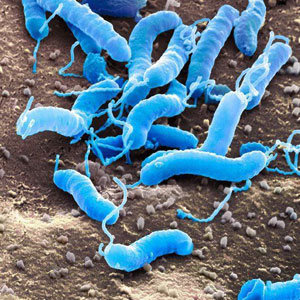Causes of Peptic Ulcer
Peptic ulcer disease cannot be attributed to a single cause as it can develop due to a number of different factors or their combination, which includes:

- Helicobacter pylori (a Gram-negative, microaerophilic bacterium which colonizes the pyloric antrum) – is responsible for up to 60% of gastric ulcers and up to 90% of ulcers in the duodenum, by causing chronic inflammation. However, despite the fact that that majority of population is infected by Helicobacter pylori, only a portion of those people develop peptic ulcers, which points to the fact that other factors are needed for the formation of a peptic ulcer.
- Nonsteroidal anti-inflammatory drugs (NSAIDs) (a class of drugs used for their antipyretic and analgesic effects), especially of the older generations (e.g. acetylsalicylic acid), block the function of cyclooxygenase 1 (COX-1), decrease the production of prostaglandins which are responsible for inflammation. However, those same prostaglandins are responsible for the production of the special mucous layer which protects the stomach’s walls from the stomach acid. New generation NSAIDs (e.g. celecoxib) block only COX-2 – which halves the damaging effect of those drugs on the stomach, however, it does not eliminate it.
- Zollinger Ellison syndrome – gastrinomas – this is a rare case of gastrin-secreting tumors. Due to this condition the acidity of the stomach’s content sharply rises, which creates multiple ulcers that heal very slowly.
- Other conditions which can rarely lead to a peptic ulcer disease include various malignant tumors located in the gastrointestinal tract (adenocarcinoma, carcinoid, sarcoma, leiomyoma), penetration of a malignant tumor from another organ, foreign objects, type 1 and 2 diabetes, Crohn’s disease (also known as regional enteritis), syphilis, tuberculosis, and HIV.
- Very acute pain (caused, for example, by burns or other major physical injury), which causes the patient to go into shock, often triggers a peptic ulcer.
Despite the views that people had until the late 20th century, factors such as smoking, diet and spices, caffeine and coffee, and alcohol, have not shown to exacerbate or cause peptic ulcers even in combination with Helicobacter pylori infection.
